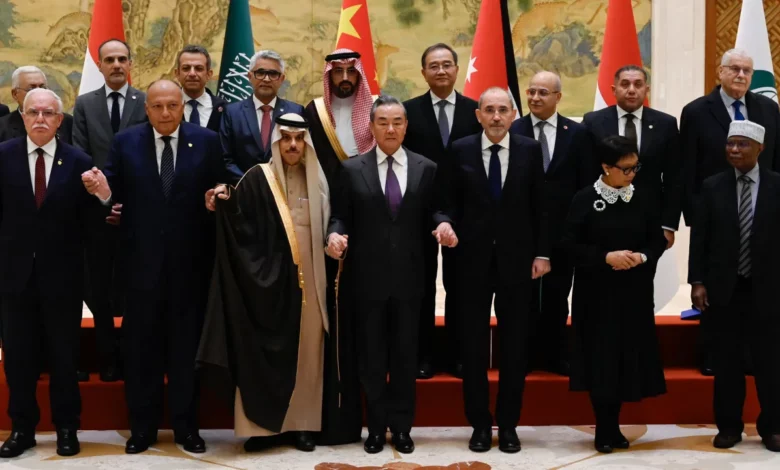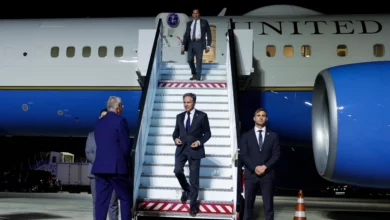
China welcomed officials from Arab and Muslim majority countries on Monday for talks on “de-escalating” the Israel-Hamas conflict as Beijing steps-up its efforts to play a role in establishing a ceasefire.
Chinese Foreign Minister Wang Yi met counterparts from Saudi Arabia, Jordan, Egypt, the Palestinian National Authority, Indonesia, as well as the head of the Organization of Islamic Cooperation in the capital Monday.
Beijing described the visit as an opportunity for “in-depth communication and coordination” on de-escalating the “current Palestinian-Israeli conflict,” protecting civilians, and “justly resolving” the Palestinian issue.
The meeting comes as sources tell CNN that a possible deal to secure the release of some hostages held by Hamas may be in sight, following weeks of negotiations between the United States, Israel and the militant group, mediated by Gulf state Qatar.
Beijing and Washington – an Israeli ally and long a major power broker in the region – have been at odds over their approach to the conflict. In particular, Beijing has criticized Israel’s retaliation and failed to condemn Hamas or name the group in its statements, sparking backlash from Israeli officials.
Israel has launched weeks of bombardment and ground operations in the Hamas-ruled enclave of Gaza following a deadly attack on its territory by the group on October 7. More than 200 hostages were taken in that attack, according to the Israel Defense Forces.
China has been attempting to play an active role in finding a solution to the conflict as it seeks to expand its position as a major global power.
Beijing dispatched a peace envoy for a multi-country tour of the region last month and has acted as a strong voice pushing for an immediate ceasefire at the United Nations, including the Security Council, where China now holds the rotating presidency.
Last week the UN body passed its first resolution on the conflict, which called for the immediate release of all hostages held by Hamas and for extended humanitarian corridors throughout the enclave to protect civilians. The US and the United Kingdom abstained, citing the resolution’s failure to condemn Hamas.
“For reasons known to all, in particular, the repeated and persistent obstruction of a permanent member of the Council, this resolution at present can only serve as a first step based on minimum consensus,” Chinese Ambassador Zhang Jun said following the vote, in an apparent veiled jab at the US.
China’s push for peace
The conflict has also given China an opportunity to bolster its already strengthening ties with a number of countries across the Arab world, and to position itself as a key voice pushing for a “two-state” solution to establish an independent Palestine – widely seen as a key path to ensuring long-term peace.
How to revive a stalled peace process is expected to be discussed between Chinese and visiting officials, who are in Beijing Monday and Tuesday.
It was also a key topic during a roughly 10-day tour in the Middle East last month from China’s special envoy for the region, Zhai Jun, who visited Egypt, Qatar, the UAE, Saudi Arabia and Jordan, according to China’s Foreign Ministry.
Last week the envoy visited and met with officials in Turkey and Bahrain, where Zhai also discussed the “regional situation” with representatives from Singapore, the US and Europe on the sidelines of an international conference.
Zhai’s itinerary thus far has not included stops in Israel, Palestinian-controlled territories, or Iran, per information released by China’s Foreign Ministry. Wang spoke with Israeli Foreign Minister Eli Cohen on the phone last month. It’s not clear if China has been in contact with Hamas officials during the latest conflict.
Visiting officials in Beijing this week include Palestinian Foreign Minister Riyad al-Maliki of the West Bank-based Palestinian National Authority.
China earlier this month dispatched the head of its Foreign Ministry’s West Asian and North African affairs department to Iran, where the conflict was part of discussions, according to a post on the department’s WeChat social media account.
Iran is a longtime backer of both Hamas and Lebanon-based Hezbollah.
During hours-long talks between Chinese leader Xi Jinping and US President Joe Biden in California last week, Biden encouraged Xi to use China’s leverage with Iran to warn against a wider regional escalation, a senior US official told CNN.
In the talks, Foreign Minister Wang Yi said they’d already held discussions with the Iranians on the topic, the senior official said.
Biden also made clear to Xi that he viewed Hamas as separate from the Palestinians. The US views Hamas as a terrorist organization that has perpetuated the suffering of Palestinian people, and has upheld Israel’s right to retaliate against the group.
Beijing has not referred to Hamas in its statements, but instead frames the current situation as a Palestinian-Israeli conflict.
CNN’s Xiaofei Xu, Martin Goillandeau, Wayne Chang, Mengchen Zhang and Sophie Jeong contributed to this report.




